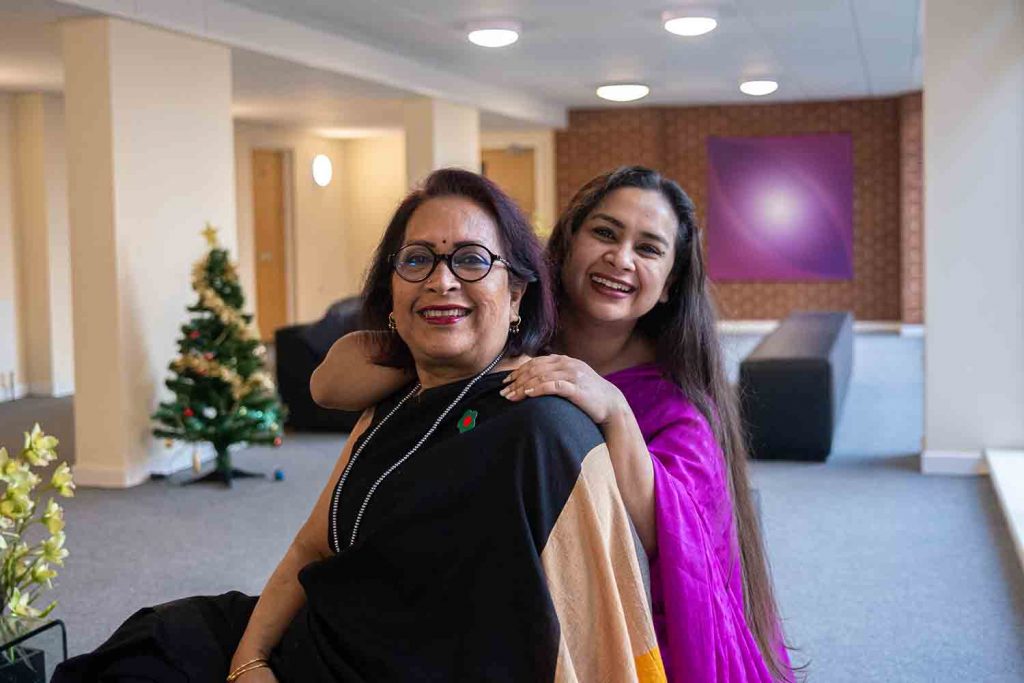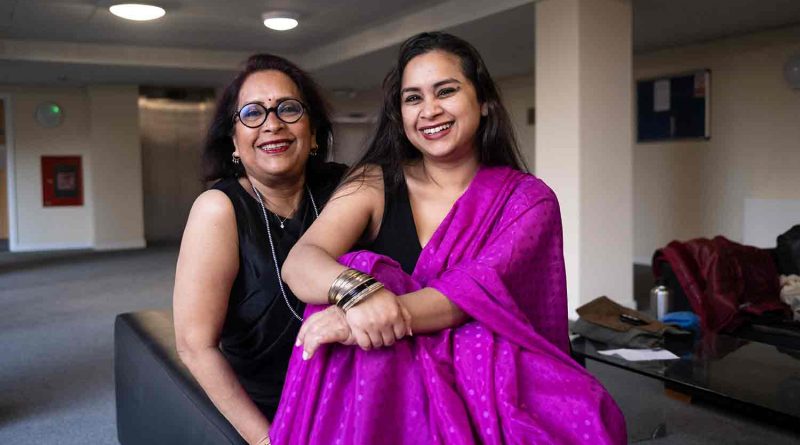From Dhaka To Bow: The mother and daughter leading a bilingual poetry collective
Bengali-born Bow residents, Shamim and Eeshita Azad are cultivating cross-cultural and inter-generational collaboration through language and words.
Upon meeting Shamim Azad at the SoBo housing complex on Mostyn Grove, she handed me a badge of a red and green flower fastened to a safety pin. It’s a ‘Bijoy Phool’ she told me, a symbol worn to commemorate the 1971 Liberation War of Bangladesh.
In English, the name translates to ‘victory flower’, and is worn throughout December, similar to that of a poppy. Shamim’s daughter Eeshita who once worked as a graphic designer, created this particular badge, her mother proudly explained.
Though she only lives in the opposite wing of the building, Eeshita is running late for the interview. She arrives wearing a fuchsia pink sari, her long dark hair falling past her waistline.
Shamim is also dressed for the occasion, her sari is regal-looking in contrasting shades of black and gold. Both their outfits are decorated with gold jewellery, and the bangles stacked on their wrists jangle as they move so that their presence is heard before they even enter the room.
Wearing traditional Bengali fashions and hand-made badges to commemorate its history, it’s immediately clear that the mother and daughter take pride in their heritage. It’s this intentional effort to celebrate cultural visibility that underpins their joint endeavour, the British Bilingual Poetry Collective (BBPC).
Initially founded by Shamim, the BBPC was an original abbreviation for the British Bengali Poetry Collective which was born in the poet’s tent held at the annual New Year Bengali festival on Brick Lane, colloquially known as Banglatown.
A combination of collective support and personal devotion pushed Shamim to permanently establish the group. ‘You hardly see British Bengali poets, and the second generation of Bengalis in the UK needed a platform’ she exclaimed.
As a first-generation Bengali who moved to the UK in 1990, Shamim worked as a primary school teacher whilst continuing her career as a poet and storyteller. To those in the British-Bengali diaspora and the global poetry world, Shamim Azad is somewhat of a household name.
The 73-year-old has published over 37 books ranging from poems to plays, her translations have been featured in literary magazines such as The New Yorker and her accolades include a list of international awards and even an invite to Buckingham Palace in 2013 – an anecdote she casually dropped into conversation at the end of our meeting.
Remaining modest in the light of her pseudo-celebrity status, Shamim turned to her daughter Eeshita when it came to consolidating the BBPC. As the current executive director, Eeshita has long-standing experience in the creative industry and arts management, working as a designer in New York City and for the British Art Council in Dhaka.
Arriving back in the UK in 2019, Eeshita channelled her expertise into her mother’s work. ‘Rather than taking part,’ she said, ‘I wanted the autonomy to register it as a company and really run with it’.
As the pandemic hit the following year and lockdown measures intensified, like everything else the BBPC meetings pivoted to Zoom calls. But this didn’t hinder the group, rather it marked a point of expansion. As emerging and established poets from Canada, Australia and Bangladesh dialled into the monthly online meetings, Eeshita realised the potential scope of their collective.
‘I registered it in 2021 and I changed the second B to bilingual so that it reflects the culture of London which is multi-cultural. What’s the point of being in London and remaining in these silos.’ Eeshita told me.
The transformation from a Bengali group to a multi-lingual collective was not only inspired by the dual heritage of its founders but is also reflective of the cultural diversity of the East End.
Commenting on their connection to the area, the mother and daughter speak in tandem. ‘I landed here in East London’ Shamim said. ‘This place is an amazing place to live, it has so much history. The truth I figured out is that the East End is the melting pot for so many migrants and immigrants.’
‘We live in a society where you walk down the street and hear three different languages at the same time’ Eeshita added. ‘East is more diverse and has an openness to arts. That’s why it’s so attractive for POCs [people of colour] to be based here and do creative work.’

With a roster of previous events including translation circles at Toynbee Hall, poetry date nights at Bow Arts and performances at Rich Mix where Shamim is a trustee, the BBPC has shown itself to be a prolific organisation in the local arts scene. The turnout proves to be just as diverse, attracting writers of all ages from Nigeria to Spain, Poland to Bangladesh. The collective has fostered a community that is emblematic of the rich demographic in East London.
But whilst celebrating this diversity, Eeshita is cognisant of falling into the trap of widening divisions. ‘The difference is the biggest similarity’ she wisely proclaims.
‘We are all multi-cultural and multi-lingual, the experiences are so similar. We approach it from the point of understanding, recognising that you and I are going to be similar, let’s just find out where.’
Similarity as a pathway towards collaboration appears to be a recurring theme in the professional and private lives of Shamim and Eeshita. As they sat side by side, it was obvious to guess that the pair were mother and daughter. Switching between Bengla, Sylheti and English as if they’d cultivated a secret language, they were quick to correct the small details of each other’s sentences, Shamim couldn’t resist the impulse to fix Eeshita’s hair.
Amongst these traits that are typical of a maternal dynamic, their relationship appeared to be grounded in trust. Eeshita remarked, ‘Mother-daughter relationships throughout history know you the best, your weakness and your strength’. Commenting on her upbringing she shared, ‘We got to experience life in a way that a lot of Bengali families and girls don’t get to. I got to go away for university and a lot of Bengali girls are not allowed to, they have to study somewhere close by. The groundwork was done by my mum as that’s what I saw growing up.’
‘She grew up with me and with the support of my husband and my children, I grew up.’ Shamim replied. ‘It is symbiotic which is why it works well in the field of arts. But in regards to cooking or something, it might be different.’ she joked.
Though they now communicate in both English and Bengali, at home the family spoke only in their mother tongue. ‘There was a strict rule that we could only speak Bengali indoors because the world outside was completely English’ Eeshita explained.
As a poet of her calibre who grew up in Bangladesh at the time of The Bengali Language Movement, it’s clear that words as a form of personal communication and cultural preservation is a sentiment that is paramount to Shamim.
‘As a language teacher, I believe when you have something in your life that’s very precious, you don’t let go.’ Shamim professed. This sense of continuation and perseverance finds light in the BBPC, the pair’s most established collaborative effort and one they have grand aspirations for.
Having just performed at A Season of Bangla Drama festival hosted by Tower Hamlet’s Council, the collective is currently holding monthly poetry workshops at The Mill House in Bromley-by-Bow and will be hosting their annual poetry tent at All Points East in Victoria Park this summer.
The BBPC has received a commission from a lecturer at City University to collaborate on a project linking food, history and poetry. In addition to their previous anthologies, Shamim and Eeshita are also hoping to release more publications showcasing the work of the BBPC.
The ultimate dream would be to go ‘totally commercial and have our name on Starbucks cups’, Eeshita said with a glint in her eye. I couldn’t tell if she was joking or not, but judging by the achievements of the mother and daughter thus far, I wouldn’t put it past them.


